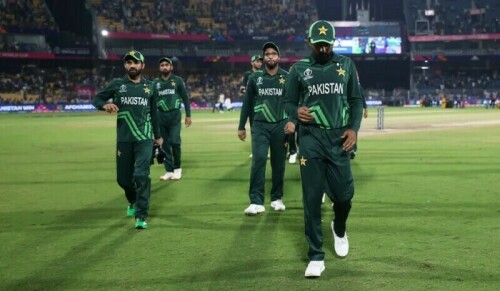As Mohammad Hafeez chopped on the first ball of Pakistan’s second innings at SuperSport Park, Pakistan’s opening partnerships in this series came to a fitting end. On this tour Pakistan’s openers have very much been fish out of water, scoring 72 runs for the opening partnerships over the course of the six innings. When the best new-ball pair in the world has failed to get them out, they’ve obliged by throwing their wicket away. While it was pathetic, it was not at all surprising. Whereas the openers are the foundation on which most international teams are based, in Pakistan it seems suitable to send two night-watchmen as openers, whose only role is to see off the new ball – a role that they fail to achieve more often than not.
The quality of Pakistan’s openers has always been the Achilles Heel of the national team. Even the greatest side in the country’s history had to employ the likes of Mudassar Nazar and Shoaib Mohammad – capable batsman, but never world class. In fact, with the exception of Hanif Mohammad and Saeed Anwar, Pakistan has never had openers that could be considered in the highest echelons of the game. For a country with six decades in international cricket, that’s a disgraceful output.
But it’s a predicament that has gotten worse over the past decade. A sea of mediocrity is what the selectors get to choose from – not that they are all that good at spotting talent anyway. Since the turn of the century, Pakistan’s openers average 32.85 – outside Asia that drops to 26.54. For comparison, the numbers for each of South Africa, England and Australia’s openers show them averaging more than 40 in that time period. And it truly is a sea of mediocrity – Pakistan, after all, have tried more openers than any other team in this time period; and the only ones to average over forty during this time period are Saeed Anwar, Fawad Alam and Shoaib Malik! Pakistan’s openers in this Test are indicative of this talent pool: on one end was Mohammad Hafeez, who has one fifty in 11 Tests outside Asia (excluding Zimbabwe); on the other was Imran Farhat who, after more than a decade during which he has played 26 Tests outside Asia, still averages less than 30 in these environs. Sure he may make the odd score every now and then, but good teams aren’t built on flimsy and inconsistent foundations. And it’s not as if there is a horde of young opening batsmen knocking on the selectors’ doors, trying to get into the team. The domestic stats of the previous couple of years don’t paint a pleasant picture.
The records of the group that debuted between 2000 and 2005 are eerily similar. All of them average in the late 30s to early 40s in First Class cricket, but even translating those not-too-extraordinary numbers to the international stage has been a struggle.
In Pakistan, the players are allowed to learn on the job as they get into international cricket – a worrying state of affairs in the first place. Not for us the likes of Mike Hussey and Kevin Pietersen who can immediately call the highest stage their own. But while the middle order batsmen – from Younis to Asad – do occasionally improve as the seasons go by, the openers seem to plateau at a mediocre level. Imran Farhat and Mohammad Hafeez are still playing the innings they were a decade ago. Not for them the incremental changes that the likes of Steve Waugh and Hashim Amla made over the course of their careers. When I asked Hafeez about what changes he was making to his approach in light of his poor form – and poor record outside Asia – he defended his technique, and said that he was working hard in the nets. Make of that what you will.
It’s a problem that can only be solved at the lower levels; by diversifying the nature of Pakistan’s pitches, by making Pakistan A and age-group teams travel far more than they do right now to alien areas. Those are exactly the things that the best teams in the world can call upon. The PCB is judged by the standard of the national team even if it’s purview and responsibility is far larger than a group of 11 individuals trying there very best, more often than not.















































